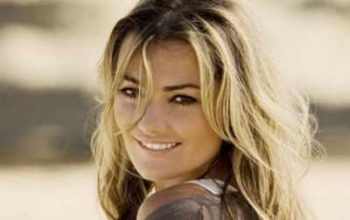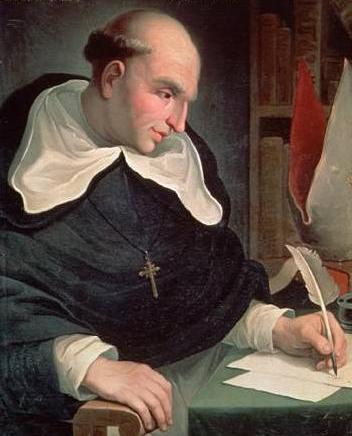August 26
Saints Days : Ceferino, Segundo, Vitoriano and Alejandro
1272 - Montpellier, Jaime I of Aragon, will ratify in donations to his children Pedro and Jaime: the barony of Ayerbe for first, and the Exerica for the second.
1542 - the expedition of Spanish conquistador Francisco de Orellana reaches the mouth of the Amazon River.
1549 - In Chile, by orders of the Spanish governor Pedro de Valdivia, Captain Francisco de Aguirre recasts the city of La Serena.

Amaia Montero
1937 - within the framework of the Spanish Civil War, the city of Santander surrenders to Franco's troops.
1983 - Severe flooding in the Basque Country, dozens perish
Births
1562 - Bartolomé Leonardo de Argensola, poet and historian baptised at Barbastro. He studied at Huesca, took orders, and was presented to the rectory of Villahermosa in 1588. He was attached to the suite of the court de Lemos, viceroy of Naples in 1610, and succeeded his brother Lupercio as historiographer of Aragón in 1613 (d. 1631)
1727 - Luis de Mission, flutist (d. 1766)

In 1807, he travelled to Spain to seek his habitation, since his status as a child born out of wedlock prohibited his promotion to the higher levels of the ecclesiastical hierarchy. He returned to New Spain in the position of vicar general. In 1810, the Regency (the Spanish government fighting the French invasion) named him bishop-elect of Michoacán. He took over the diocese before the arrival of the pontifical bull confirming his position. The pope did not approve his nomination, and thus the bull never arrived
(d. 1825)
1837 - Manuel Cassola, soldier (d. 1890)
1844 - José Villegas Cordero, painter (d. 1921)
1860 - Luis Siret, archaeologist (d. 1934)
1890 - Alvaro Retana, writer, illustrator and composer (d. 1970)
1921 - Joaquín Luis Romero Marchent, film maker (d. 2012)
1945 - Javier Tusell, historian (d. 2005)
1948 - Ángel Guinda, poet.
1958 - Juan Señor, footballer.
1962 - Vicky Larraz, singer.
1964 - Silvia Espigado, actress.
1969 - Jorge Sanz, actor.
1971 - Lizard González, basketball player.
1975 - Kiko Hernández, TV personality.
1976 - Amaia Montero, singer-songwriter (La Oreja de Van Gogh - Guapa) born in Irun
1979 - Rubén Arriaza Pazos, footballer
1983 - Félix Porteiro, race car driver born in Castellón
Deaths
1785 - Ventura Rodríguez, architect (b. 1717)
1791 - José Iglesias de la Casa, poet (b. 1748)
1810 - Santiago de Liniers, 1st Count of Buenos Aires, French-Spanish sailor and politician, 10th Viceroyalty of the Río de la Plata (b. 1753)
1816 - Vicente Joaquín Osorio de Moscoso y Guzmán, aristocrat (b. 1756)
1884 - Antonio García Gutiérrez, writer of Zarzuelas (b. 1813)
1897 - Teresa de Jesús Jornet e Ibars, nun (b. 1843)
1902 - Hermógenes Pérez de Arce Lopetegui, politician and journalist (b. 1845)
1923 - Ricardo Codorníu y Stárico, engineer (b. 1846)
1951 - Adelardo Covarsí, painter (b. 1885)
1953 - Manuel Lorenzo Pardo, politician and photographer (b. 1881)
1955 - Gregorio Aráoz Alfaro, doctor (b. 1870)
1964 - Sixto Cámara Tecedor, mathematician (b. 1878)
1985 - Leopoldo Querol, pianist (b. 1899)
1990 - Vicente Flores Navarro, artist (b 1911)
1992 - Jose María Angelat, actor (b. 1921)
1994 - Jesus Otero, sculptor (b. 1923)
1995 - Josep Pi-Sunyer, Catalan politician (b. 1913)
2002 - Miguel Querol Gavalda, composer (b. 1912)
2006 - Liliana Durán. actress (b. 1935)

Educated at a Jesuit school, Panikkar studied chemistry and philosophy at the universities of Barcelona, Bonn and Madrid, and Catholic theology in Madrid and Rome. He earned a doctorate in philosophy at the University of Madrid in 1946 and a doctorate in chemistry in 1958. He earned a third doctorate in theology at the Pontifical Lateran University in Rome in 1961, in which compared St. Thomas Aquinas's Philosophy with the 8th-century Hindu philosopher Ādi Śańkara's interpretation of the Brahma Sutras.
In 1946 he was ordained a Catholic priest and became a professor of philosophy at the University of Madrid.
He made his first trip to India in 1954 where he studied Indian philosophy and religion at the University of Mysore and Banaras Hindu University, where he met several Western monks seeking Eastern forms for the expression of their Christian beliefs. "I left Europe [for India] as a Christian, I discovered I was a Hindu and returned as a Buddhist without ever having ceased to be Christian", he later wrote.
While in Jerusalem during 1962, he was summoned to Rome by the Opus Dei founder and director, Jose maria Escrivá, who expelled him after a brief trial where he was charged with disobedience to the organization.
In 1966 he became a visiting professor at Harvard Divinity School and a professor of religious studies at the University of California, Santa Barbara in 1972, and for many years he taught in the spring and spent the rest of the year doing research in India. Where the typical approach to cross-cultural religious studies, especially in a secular university, was to hold two or more traditions at arm's length and draw lines of comparison between them, Panikkar's approach was to view issues in the real world through the eyes of two or more traditions.
In 1987 he moved to Tavertet in Cataluña, in the hills north of Barcelona, where he founded the Raimon Panikkar Vivarium Foundation, a center for intercultural studies. In 2005 he created Arbor, for the realization of his principle of interreligious collaboration for the relief of poverty in thousands of villages of India.
Panikkar authored more than 40 books and 900 articles. His complete works are being published in Italian. His 1989 Gifford Lectures were published in English by Orbis in 2009 under the title The Rhythm of Being.
2010 - Miguel Ángel Castanedo, businessman (b. 1948)
